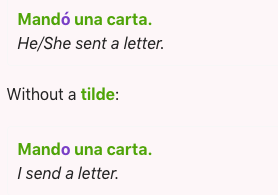西班牙语学习!
词汇
代词
Yo - I
Mi - my, me
Mis amigas siempre necesitan muchos zapatos. = My friends always need a lot of shoes.
放在介词后面 la camiseta es para mi. = The t-shirt is for me.
T$\acute u$ - You | usted=you | ustedes = you guys
usted 第三人称处理
Tu - yours
Señora Castro, ¿usted necesita sus vestidos ahora? = Mrs. Castro, do you need your dresses now?
— because the sentence is in the formal format where you use “Usted”. If the sentence was in the form of “Tu” then you would also write “tus” “necesitas tus vestidos ahora” vs “usted necesita sus vestidos ahora”.
ti - you
放在介词后面
Estos pantalones son para ti. = These pants are for you.
A ti no te gusta el pastre. = You don’t like the cake.
A usted le gusta mucho leer. = You like reading a lot.
Ella - She
主语,也可以放在介词后面。
Este vestido no es para ella. = This dress is not for her.
su - her/his/their/your(usted)/its
“Señor Herrera, ¿estas son sus camisas?” = Mr. Herrera, are these your shirts?
sus zapatos nuevos. = his new shoes
$\acute El$ - He,him
主语,也可以放在介词后面。
Nosotros / Nosotras somos - we are
主语,也可以放在介词后面。
Esta fiesta es para nosotros? = Is this party for us?
nuestro/a - our
De donde es nuestra abuela? = where is our grandmother from.
Nuestro abuelo es italiano = Our grandfather is italian.
ellos | ellas son - they are
ni$\tilde n$a - girl
ni$\acute n$o - boy
los ninos = the children
mujer - woman || las mujeres
hombre - man || los hombres
chico / chica - boy / girl
nadie - nobody
muchacho/a - young boy/girl
Ellos nos necesitan ahora. = They need us now.
Tu esposa te compra libros? = Does your wife buy you books?
Cuantas munecas te compra tu ebuelo? = How many dolls is your grandfather buying you?
por que ellos no te visitan? = Why do they not visit you?
物主代词
mio/a - mine
tu carro o el mio - your car or mine
tuyo/a - yours
mi carro o el tuyo - my car or yours
suyo/a - hers, theirs
Use ‘tuya’ when in 2nd person(tu). Use ‘suyo’ whne in 3rd person(usted,el,ella).
‘suya’ is more formal.
nuestro/a - ours
人称代词
mis - my | mis padres= my parents
su - his/her | sus regalos= his gifts
sus amigas - their friends
be动词
somos
eres(2) - are
era(1) eras(2) eran(they), eramos(we) - were {eras nino = you were a child}
fui(1), fuiste(2), fue(3), fueron(they), fuimos(we) - was, went
yo fui maestro por muchos anos = i was a teacher for many years
fui de vacationes - went on vacationes
For sb:
para mi - for me
para ti - for you
para ustedes - for you guys
para ella - for her
para $\acute e$l - for him
para nosotros - for us
a sb * gusta
A mi me gusta - i like
A usted le gusta / A ti te gusta - you like
A ustedes les gusta - you guys like
A el le gusta - he likes
A ellos les gusta - they like
A nosotros nos gusta - we like
宾格(Accusative case | Objective case)
直接宾格
一般直接放在动词前面
lo - him / it /
la - her / it /
El vestido es bonito, pero no lo compro.
Esta tienda, ya la conozco.
los / las - them
间接宾格
le - him/her
Le hago preguntas porque ella es interestante. = I ask her questions because …
ellos le compran un vestido = they buy her a dress
mi padre les da mucho dinero = my dad gives them many money
Ella les manda regalos = She sends gifts to them.
Ella les manda regalos a sus abuelos = She sends gifts to her grandparents.
yo le hablo a la mesera en frances = i speak to the waitress in french
me
(no) lo quiero - I (don’t) want it
ese carro es muy bueno y lo quiero = That car is very good and I want it
esa falda es bonita, pero no la quiero = That skirt is pretty but I don’t want it
me gusta esa chaqueta y la quiero comprar
los quiero - I want them
estos pasteles son muy buenos y los quiero. = These cakes are very good and I want them.
Que comida les gusta a ustedes? = What food do you like? (放后面)
A el que le gusta? = What does he like? (放前面)
介词
En - In
el - on
los - on | los lunes=on mondays
a - to
o - or
sobre - on, about, around
sobre el escritorio = on the desk | sobre la cama = on the bed
leo sobre pajaros = read about birds
sobre las once = around 11.
debajo de - under
y - and
con - with
sin - without
de - from/of
desde - from
El nino camina desde aqui = The boy walks from here.
para - for, in order to
el turista sale para Peru manana. = The tourist is leaving for Peru tomorrow.
por - for
tres huevos por dos pesos. = Three eggs for two pesos.
por tren/ por avión
ella no quiere conducir por la tormenta - she doesn’t want to drive because of the store
aqui / ac$\acute a$ - here
all$\acute a$ - there
alli - there
D$\acute o$nde - Where
ad$\acute o$nde - to where
si - if
Cu$a$ndo - when
mientras - while
A qu$\acute e$ hora - when/what time
A que hora te levantas? = what time do you get up
A qué hora se levanta usted mañana? = what time are you getting up tomorrow?
que hora es? = what time is it
Qu$\acute e$ - what
Qu$\acute e$ interestante. = How interesting.
Qu$\acute e$ vestido tan bonito. = What a pretty dress.
Qu$\acute e$ divertido eres, Juan. = You are so fun, juan.
Qu$\acute e$ interestante es tu amigo = Your friend is so interesting.
que - that
cual - which
difference between que and cual difference
When you use que, you are asking for a definition, while cual us for asking between options.
cual es el precio? = what is the price?
¿Cuáles son tus clases favoritas = what is yoru favorite classes
Qui$\acute e$n - who/whom
quienes son esas jovenes = who are those women
Cu$\acute a$ntos / Cu$\acute a$ntas - how many
puede - can you
puede traer un vaso, por favor = can you bring a glass, please
mucho - a lot
el necesita mucha agua.
quiero mucho arroz.
contigo - to you / with you
conmigo - with me
los lunes - Monday
el lunes que viene = next monday
los martes - Tuesday
los mi$\acute e$rcoles - Wednesday
los jueves - Thursday
viernes - Friday
los s$\acute a$bado - saturday
domingo - sunday
el proximo domingo = next sunday
el domingo que viene = next sunday
semana - week
fin de semana - weekend |los fines de semana= on weekends
el dia - day
hoy - today
ma$\tilde n$ana - morning/tomorrow || manzana= apple
en la manana = in the morning.
ayer - yesterday
antes - before
antes de las nueve = before nine
despu$\acute e$s - after
dos horas despues = two hours later
tan .. como .. - as .. as …
somos tan bonito como tu = we are as pretty as you
tan - so
esta bicicleta es tan vieja. = This bicycle is so old.
pr$\acute o$ximo/a - next
el proxima viernes - next friday
detr$\acute a$s de - behind
entre - between
entre las cinco y seis de la tarde = between 5 and 6 in the evening
dentro de - inside
fuera de - outside
arriba - upstairs
las habitaciones estan arriba. - the rooms are upstairs
abajo - downstairs
atr$\acute a$s - back
final de - end of
oye - hey
excepto - except
hasta - until
alrededor - around
alrededor del mundo - around the world
asi - therefore,so
vaya - wow
hacia - toward
desde - since
contra - against
a traves de - through
usted conduce a traves de esa aldea? = do you drive through that village?
bajo - under
que tienes bajo la mesa - what do you have under the table
segun - according to
segun usted, es rojo = according to you, it is red
系动词
Un (m), Una (f) - a
este(male), esta(fem) - this | estos vestidos + estas carteras = these
estabas(2) , estabamos(we) - were
esto - this
esto es muy diferente = this is very different.
eso - that
me ayudas con eso = can you help me with that
ese / esa - that
aquel / aquella - that
aquellos / aquellas - those
Si - Yes
soy - am || ser=to be
======Ella está cansada.
Está is for something temporary and es is for something permanent. In this case, she is tired, at the moment. If she was always tired, it would be es.
est$\acute a$s(2), est$\acute a$(3), estamos(we), estan(they) - be (临时) | estar= to be
tengo que estar en el aeropuerto a las dos. = I have to be at the airport at two.
es, - is,
eres - are (tu)
El (pos), La (neg) - the (单数)
los(mas), las(fem) - the(复数)
estoy - I am
动词
及人动词
reflexive pronouns link
me(myself)
te(yourself)
se(himeself, herself, yourself)
nos(ourselves)
os(yourselves)
se(themselves, yourselves)
~rse=to
pongo(1), pones(2) - put, put on | ponerse= to put on / ponerte
me pongo | se ponen
Rafael, pon aquellas xx en mi casa. = put those xx at my home
senor, ponga esas silas. = sir, put those chairs
puse(1) pusimos - put
cepillo(1), cepilla(3), cepillan(they), cepillamos(we) - brush | cepillarse= to brush
ellas se cepillan el cabello en el bano = they brush their hair in the bathroom
ella se cepilla su cabello largo = she brushes her long hair.
ducho(1), ducha(3), duchan(they) - shower | ducharse= to shower | ducharte(to ~)
mi perrp nunca se ducha.= My dog never showers.
ella tiene que ducharse hoy. = she has to shower today
hijo, tienes que ducharte antes de salir. = Son you have to shower before leaving.
quedo(1), queda(3), quedamos(we) - stay | quedarse= to stay
los ninos van a quedarse con esos juguetes - the chidlren are going to keep those toys
digo(1), dice(3), dicen(they), decimos(we) - tell, say | decir= to tell
te voy a decir algo = I am going to tell you something.
me vas a decir tu nombre? = Are you going to tell me your name?
dije(1),dijiste(2),dijo(3) - said,told
sit down | sentarse = to ~ | sientate(u), sientese(ud)=!,
lavo(1), lava(3), lavan(they), lavamos(we) - wash | lavar / lavarnos= to wash | lavate(u), lavese(ud)=~!
lav$\acute o$(3), lavaron(they) - washed
nos lavamos en el bano del hotel. = We wash ourselves in the hotel bathroom
mi gato no tiene que lavarse. = My cat doesn’t have to wash itself.
pedro se lava las manos antes de comer = Pedro wahes his hands before eating
queremos lavarnos las manos = we want to wash our hands
Pablo, lavate las manos = Pablo, wash your hands.
despierto(1), despierta(3), despertamos(we) - wake up | despertar=to ~
acuerdo(1) acuerda(3) | acordar de - to remember
tienes que acordarte de eso = you have to remember that
acuesto(1),acuesta(3),acostamos(we) - | acostar - to go to bed
preocupo(2) - worry
me preocupo por - I worry about
siento(1), sienta(2), sentamos(we) - sit
vestir - to dress
caer - to fall
Ayuda, creo que voy a caerme. = Help, I think I am going to fall.
reir - laugh
caso(1) casamos(we), casan(they) - get married
lleva(3) llevamos(we) se llevan(they) - get along with
subo(1)sube(3) subimos(we) | subir - get in, get on, go up
volver - become
apuro(1) apura(3) apuramos apuran - hurry
quito(1)quita(3)quitamos quitan | quitar - take off
besamos besan | besar - kiss
me cae(1) - like
tu primo me cae bien - i like your cousin
tu amigo juan me cae mal - i don’t like your friend juan
abrazamos abrazan|abrazar - hug
tumbo(1) tumba(3) tumban - lie down | tumbar
nos retrasamos - delay
rio(1) ries(2) reimos rien- laugh(及人)
caigo(1) caes(2) caemos caen de - fall off/down
bajo(1) bajan - get off | bajar de (及人)
不及物动词
dudo(1), duda(3) de - doubt
salvo(1) salva(3) a - save
manejo(1), meneja(3), manejan(they), manejamos(we) - drive | manejar= to drive
manejo a mi trabajo = drive to my work.
manejo el carro = drive the car
conduzco(1) - drive |
voy(1), vas(2), va(3), van(they), vamos(we) - go | ir =to go | iba - used to go
请求 felipe, ven ahora - come now
se va(3) - leave | irse, irte - to leave
cuando vas a ir a Espanola = when are you going to spain
rafael, ve a mi oficina ahora = go to my office now
senor, vaya mas tarde = sir, go later
viajas(2), - travel | viajar=to travel
Quieres ir al parque hoy? = Do you want to go to the park today?
viaja a muchos paises = travel to many countries
salgo(1), sales(2), salen(they), salimos(we) - leave | salir=to leave | saliendo=~ing
salio(3), salieron(they), salimos(we)
salgo de casa = leave the house
salen a cenar = go out to dinner
llego(1), llegas(2), llegan(they), llegamos(we) - arrive | llegar= to arrive
llegue(1)
llega al aeropuerto = arrive ar rge airport
llamo(1), llama(2), llaman(they) - name, call | llamar= to call
me llamo | se llama | se llaman
Como se llaman tus padres? = What are your parents’ names?
mi esposo llama a su madre. = My husband calls his mother.hist
vamos a llamar a dos taxis. = we are going to call two taxis.
amo(1), ama(3), amamos(we) - love | amar= to love
A ama a B. = A loves B.
vuelves(2), vuelven(they), volvemos(we) - come back | volver= to go back | vuelva(ud), vuelve(tu) = command
tu vuelves del trabajo a las nueve. = You come back from work at nine
usted vuelve a casa en la noche = you come back home at night
escucho(1), escuchas(2), escuchan(they), escuchamos(we) - listen to ||escuchar= to listen | escuchando= listening to
escuchamos(we) - listened to
escucho musica = listen to music
escucho la radio = listen to the radio
escucho a la maestra
vengo(1), viene(3), venimos(we) - come | venir= to come
vine(1), viniste(2), vino(3), vinieron(they), vinimos(we)
quieres venir al cine? = do you want to come to the movies?
cuando vienes a casa = when do you come home
cuando vienen tus amigos de mexico? = when do your friends come from mexico
invito(1), invitan(they), invitamos(we), - we | invitar= to invite
请求 senor, invite a su esposa. / victoria, invita a tu amiga al partido de futbol.
nosotros invitamos a Maria. = We invite maria.
ella te invita = she invites you
me vas a invitar? = are you going to invite me
ella te invita al baile el viernes = she invites you to the dance on Friday.
ayudo(1), ayudas(1), ayudan(they), ayudamos(we) - help
ellos ayudan a los ninos. = They help the boys.
te ayudo a limpiar la cocina = i help you to clean the kitchen
aprendo(1), aprendes(2), aprendemos(we) - learn | aprender=to learn | aprendiendo=~ing
aprendiste(2), aprendio(3), aprendieron(they), aprendimos(we) -
estamos aprendiendo a cocinar = we are learning to cook
ense$\acute n$o(1), ense$\acute n$a(3), ense$\acute n$an(they) ense$\acute n$amos(we) - teach | ense$\acute n$ar= to teach
ensena ingles a Felip = teach felip english. | teach english to felip.
tu madre te ensena a nadar = does your mother teach you to swim
show
te enseno mi granja? = Can i show you my farm
conozco(1), conoces(3), conocen(they), conocemos(we) - know | conocer= to know
concoces a mi padre. = You know my father || (people)
mi hijo conoce muchos paises. = My son knows many countries. || (place)
conoci(1), conociste(2), conocimos(we) - knew
empiezo(1), empieza(3), empiezan(they), empezamos(we) - start | empezar= to start
empece(1), empezaste(2), empezo(3), empezaron(they)
~ a estudiar japones. = start to study japanese.
pinto(1), pintas(2), pinta(3), pintan(they), pintamos(we) - paint | pintar= to paint | pintado/a - painted
Ella pinta su dormitorio azul = She is painting her blue bedroom.
Ella pinta su dormitorio de azul = She is painting her bedroom blue.
esta pared, la pintamos de color azul. = This wall we paint it blue.
las paredes estan pintadas de azul= the walls are painted blue
giro(1), gira(3), giramos(we) - turn | girar=to ~
senor, gire a la izquierda. = Turn to the left
espero(1), espera(3), esperamos(we), - wait, hope | esperar=to ~ | esperando=~ing
~ un minuto = wait a minute
yo espero a juan en el hotel
tienes que esperar media hora = You have to wait half an hour
espero en la fila - wait in the line
nosotros esperamos viajar pronto - we hope to travel soon
espero que si - i hope so
elijo(1), elige(3), eligen(they), elegimos(we) - choose | elegir=to ~
tu eliges a los mejores estudiantes = you choose the best students.
及物动词
cantan(they), cantamos(we) - sing | cantar= to sing
mi mama me canta. = My mother sings to me
vuelo(1) vuela(3) vuelan volamos - fly to | volar= to fly
~ un avion = fly a plane
ellos vuelan de Boston a Alemaniu
mando(1), manda(3), mandamos(we) - send | mandar=to ~
estuve(1), estuviste(2), estuvo(3), estuvieron(they), estuvimos(we) - was/were
ayer estuve en madrid = yesterday i was in madrid
donde estuviste la semana pasada = where were you last week
como, come, comen - eat | comer=to eat | comiendo= ~ing
comi(1), comiste(2), comio(3), comieron(they), comimos(we) - ate
esos sandwiches, ellos no los comen. = Those sandwiches, they are not eating them.
hablo(1), hablas(2), hablamos(we), hablan(they) - speak | hablar=to speak | hablando= speaking | hable(ud), habla(tu) - command
hablaste(2)
necesito(1), necesitas(2),necesita(3) - need | necesitala - need it
tengo(1), tienes(2), tiene(3), tienen(they), tenemos(we) - have | tener=to have
tenia(1) - used to have
tuve(1),tuviste(2),tuvo(3) - had
tengo que estudiar= have to study
tengo/tiene puesto una ropa. = I (she) have on a clothes.
tengo/tiene ganas de jugar al futbol. = feel like playing soccer
bebo(1),bebes(2), bebe(3) - drink | beber=to drink | bebiendo=~ing | beba(ud), bebe(tu) - command
bebi(1), bebiste(2), bebimos(we)
senora, beba este jugo, por favor. = Ma’am, drink this juice, please
quiero(第一人称), quieres(2), queremos(we), quieren(you guys)- want
Mi abuelo me quiere mucho. = My grandfather loves me very much.
queria(3), querian(they) - wanted
quise(1) quisiste(2) quiso(3) quisimos quisieron - wanted
pago(1), pagas(2), paga(3), pagan(they), pagamos(we) - pay | pagar=to pay
cuanto pagaste por ese vestido negro = how much did you pay for that black dress
vivo(1), vives(2), viven(they), vivimos(we) - live | vivir= to live
vivi(1), viviste(2) - lived
vivire(1) viviras(2), viviremos() viviran(they) - will live
compro(1), compras(2), compra(3), compran(they), compramos(we) - buy | comprar - to buy
Yo voy de compras. = I go shopping.
senor and senora lopez, compren estos libros = Mr. and Mrs. Lopez, buy these books.
estudio(1), estudias(2), estudia(3), estudiamos(we), estudian(they) - study | estudiar=to
study | estudiando= studying | estudia(tu) - command
estudie(1), estudiaste(2) - studied
leo(1), lees(2) leen(they) - read
lei(1) leiste(2),leyo(3), leyeron, leimos
escribo(1),escribes(2),escriben(they), escribimos(we) - write | escribir= to write | escribiendo=~ing | escriba(ud) = command
escribio(3), escribieron(they), escribimos(we) - wrote
comprendo(1), comprende(3), comprenden(they) - understand | comprender=to ~
entiendo(1), entiende(3), entienden(they), entendemos(we) - understand | entender= to understand
usted me entiende? = do you understand me?
disfruto(1), disfruta(3), disfrutan(they), disfrutamos(we) - enjoy | disfrutar=to enjoy
disfrute(1)
Mi plan es disfrutar mucho. = My plan is to enjoy a lot.
trabajo(1),trabaja(3) - work | trabajar=to work | trabaje(ud) = command
Senor Sanchez, trabaje para nosotros. = Mr. Sanchez, work for us.
uso(1), usas(2), usa(3) - use, wear | usar - to use
duermo(1) duerme(3) duermen(they) dormimos(we) - slept | dormir=to sleep | dormido/a - asleep| durmiendo - sleeping
siento(1), siente(3), sentimos(we) - feel | sentir - to feel
Me siento casada hoy. = I feel tired today.
Tu tambien te sientes feliz. = You also feel happy.
Como se siente tu hermano? = how does your brother feel?
siento always requires a ‘me’ in front of it. Sientes requires a ‘te’. Siente requires a ‘se’.
me siento enfermo del estomago = I feel sick to my stomach
gusta - like | te gustaria - would you like to | gustar= to like
me gusta mucho el te = I like tea a lot.
A ellos les gusta … = They like
A mi padre le gusta el baloncesto. = My father likes basketball. (Le gusta means it is pleasing to him/her/it. For”A mi padre le gusta el baloncesto, you are literally saying Basketball i pleasing to my father. To my father=A mi padre)
A el que le gusta?= What does he like?
Me gustan estos vinos chilenos. = I like these Chilean wines.
Esto te va a gustar mucho.
— There isn’t a Spanish verb for “to like”. Instead, in Spanish you use “gustar”, which literally means “to please”. As a result, the subject and object are reversed. In this case, “Esto te va a gustar mucho” means “This is going to please you a lot”. “This” is the subject and “you” is the object so you have to use “va” instead of “vas” because it is “This” doing the action.
Creo que te va a gustar = I think you are going to like it
No me gustaron los platos de este restaurante
encanta - love
me encanta - I love
te encanta - you love
nos encanta - we love
les encanta - they love
a usted le encanta - you live
enterarse de - find out
entere(1) enteraste(2) entero(3) enteramos(we) enteraron(they) - found
camino(1), caminan(they), caminamos(we) - walk | caminar=to walk
caminamos(we) - walked
tome(1), toma(3), tomamos(we) - take| tomar=to take
senor, tome el autobus aqui.
carmen, toma el autobus.
irme - leave
creo(1) - think
creo que = I think that
miro(1), mira(3), miran(they), miramos(we) - watch | mirar = to watch | mirando=~ing
mir$\acute o$(3), mirarion(they) - watched
estamos mirando la tele en la casa = we are watching tv in the living room
miro las fotos = look at the photos
juego(1), juegas(2), juegan(they), jugamos(we) - play | jugar= to play
jugar al baloncesto = play basketball
jugar al tenis = play tennis
toco(1), toca(3), tocan(they), tocamos(we)- play ||tocar= to play
nado(1), nada(3), nadan(they), - swim | nadar - to swim
corro(1), corres(2), corren(they), corremos(we) - run | correr= to run
corrimos(we)
dibujo(1), dibujas(2), dibujan(they), dibujamos(we) - draw | dibujar - to draw | dibujando=~ing
levanto(1), levantas(2), levanta(3) - get up |levantarme /levantarte /levantarse= to get up | levantate(2), levantese(ud)=!
me levanto a las diez. = I get up at 10.
A veces tu te levantas cansada. = Sometimes you get up tired.
El se levanta = he gets up.
Mi esposo nunca se levanta conmigo. = My huaband never gets up with me.
el no quiere levantarse. = he doesn’t want to get up.
Tienes que levantarte ahora = you have to get up now
necesito levantarme temprano manana = I need to get up early tomorrow
levantate rapido = get up fast
levantate de la silla = get up from the chair
querria - I would like
quisiera(1) - would like
quisiera algo de beber = i would like something to drink
traigo(1), traes(2), traemos(we) - bring| traer - to ~
traje(1), trajiste(2), trajo(3)
cojo(1), coges(2), cogen(they) - take | coger=to ~
voy a coger el vestido rojo = i am going to take the red dress
limpio(1), limpias(2), limpia(3), limpian(they), limpiamos(we) - clean |limpiar= to clean
limpi$\acute o$(3), limpiaron(they) - cleaned
busco(1), buscas(2), busca(3), buscan(they) | buscar= to look for/ search/ |buscando=~ing
cierra(3), cierran(they), cerramos(we) - close | cerrar= to close | cierra(tu) - command
cerro(1), cerraron(they) - closed
abro(1), abre(3), abren(they), abrimos(we) - open| abrir= to open | abriendo=~ing |abre(tu) = command
abrio(3), abrieron(they), abrimos(we) - opened
estamos abriendo los libros = we are opening the books
cada(3) - open
puedo probar - try on
Dónde me puedo probar esta camisa? = Where can I try on this shirt?
cuesta(3), cuestan(they) - cost
Todas las camisas cuestan veinte pesos. = All the shirts cost twenty pesos.
cuanto cuestan los tomates? = How much do the tomatoes cost
cuanto cuestan las naranjas?
Cuesta mucho nadar = It is hard to swim
visito(1), visita(3), visitan(they), visitamos(we) - visit | visitar= to visit
visite(1), visitaste(2), visitamos(we) - visited
visito a sb. = visit sb
visito el parque = visit park.
veo(1), ve(3), ven(they), vemos(we) - see | ver= to see
vimos(we)
veias(2)veia(3),veiamos(we) veian(they) - used to see
tengo que ver a Duo. = I have to see Duo,
yo veo muchas peliculas. = I watch many movies.
veo la tele = watch tv
yo quiero verme muy bien = I want to look very good
monto(1), monta(3), montamos(we) - ride | montar= to ride
montamos(we) - rode
monto a caballo. = I ride horses.
monto las bicicletas = ride bikes
hago(1), haces(2), hacen(they), hacemos(we) - make | hacer= to make | haciendo=~ing
hice(1), hiciste(2), hizo(3), hicieron(they), hicimos(we)
hacias(2)hacia(3)haciamos(we)hacian - used to do
que hacen ustedes aqui? = What are you doing here
tu haces un sandwich? = are you making a sandwich?
hace su cama = make his bed.
hace la tarea = do the homework.
hace el trabajo. = do the work
hace muchas preguntas = ask many questions
hace cinco anos = 5 years ago
hace un ano = one year ago
pedro, haz tu trabajo = do you work
senor, haga preguntas= sir, ask questions
hacer clic - click
bailo(1), bailas(2), bailan(they), bailamos(we) -dance | bailar= to dance
bailamos(we) - danced
paso(1), pasa(3), pasan(they), pasamos(we) - spend, pass | pasar= to spend
pasamos(we)
paga una semana en Francia. = Spend a week in France.
me pasas esa regla? = can you pass me that ruler
almuerza(3), almuerza(they), almorzamos(we) - have lunch | almorzar= to have lunch
almorce(1) - had lunch
pruebo(1) ,prueba(3), prueban(they), probamos(we) - try | probar / probarse= to try | pruebe(ud) = command | prob$\acute e$=~ed
Senor, pruebe este vino blanco. = Sir, try this white wine
la senora necesita probarse esa falda = The lady needs to try that skirt
vas a probate estos pantalones = are you going to try on these pants
puedo(1), puede(3), pueden(they), podemos(we) - can, be able to | poder= to be able to
es importante poder trabajar. = It is important to be able to work.
pude(1), pusiste(2),pudo(3) - wan’t able to
comienzo(1) comienza(3) comienzan(they) | comenzar=to ~
comienza a - start to
pierdes(2), pierden(they), perdemos(we) - lose | perder= to lose
perdi(1) perdio(3) - missed,
interesa - be interested in
me interesa | A pablo le interesa
Este libro me interesa mucho. = I am very interested in this book.
practicamos(we) - | practicar= to practice
practique(1), practicamos(we)
s$\acute e$(1), sabes(2), saben(they), sabemos(we) - know | saber= to know
como se dice gato en italiano? = How do you say cat in italian
como se escribe el nombre? = How you write the name?
No lo s$\acute e$ = I don’t know
sabe usted donde esta el cine? = Do you know where the theather is
yo se que - i know that
supe(1), supiste(2),supo(3) - knew
lleva(3), llevan(they), llevamos(we) - carry | llevar= to carry
lleva puesto un sombrero(3) - wear a hat
cocino(1), cocinan(they), cocinamos(we) - cook | cocinar= to cook
cocin$\acute o$(3), cocinaron(they)
cambia(3),cambiamos(we) - change, exchange |cambiar=to change | cambiando=~ing
pienso(1), piensas(2), piensan(they), pensamos(we) - think | pensar=to~ | pensando=~ing
~ en muchos cosas = think about many things
~ que = think that
~ que no = I don’t think so
pienso en ti = think of you
parece - think, seem
que te parece = what do you think
cenar=to have dinner
cenamor(we) - had dinner
desayunar=to have breakfast
encontra(3) - find | encontrar= to find
me/se encuentro(1), encuentra(3) - meet up
encontra con - meet up with
recuerdo(1), recuerda(3) - remember| recordar=to remember
doy(1), da(3), dan(they) - give | dar= to give
dio(3),dimos(we),dieron(they) - gave
pregunto(1), pregunta(3), preguntan(they)- ask | preguntar=to ~
por que no le preguntas a Maria ahora = Why don’t you ask Maria now
sigo(1), sigue(3), siguen(uds), seguimos(we) - continue, follow | seguir=to ~
siga por aqui = continue through here
maria, sigue cinco minutos mas. = maria, continue for 5 more minutes.
tienes que seguir empujando = you have to keep pushing
olvido(1), olvida(3), olvidamos(we) - forget | olvidar=to ~
ella no tiene que olvidarse de su cita = she must not forget her appointment
ella se olvida de beber mucha agua = she forgets to drink a lot of water
morir - to die | muriendo=dying
smoke | fumar=to ~
respondo(1) responde(3) - answer
nevar - to snow | nevando - snowing
llover - to rain | lloviendo - raining
oigo(1),oye(3),oimos(we) - hear | oir - to hear
quedo(1), queda(3), con - get together withs
acabar - to finish
ella acaba de beber vino = she just drank wine
sueno(1) suena(3) sonamos(we) suenan(they) con - dream about | sonar - to ~
prefiero(1),prefiere(3),preferimos(we) | preferir - to prefer
odio(1) odia(3) odian| odiar - to hate
odio a otras personas = hate other people
odia la clase = hate the class
para(3) paramos | parar de - to stop doing / pararme - to stand up
haber=to be
servis(2) - serve | servir - to ~
pido(1) pide(3) - order | pedir=to ~
quiero pedir prestado un poco de dinero - want to borrow a little money
parece -
esto me parece un poco aburrido = this seems a little boring to me
acompano(1),acompana(3) - go with sb | acompanar
converso(1), conversamos(we) | conversar
recibir - to receive
apaga(3) - turn off | apagar=to ~ / esta apagado/a - is offencender - to turn on | esta
enciendo(1), encendemos(we) - turn on | encendido/a = be on
perder - to lose | perdido/a - lost
deberias(2),deberia(3) - you should
hay que - one must
duele(3),duelen(they) - hurt| doler= to ~
me duele le espalda = my back hurts
me duelen mucho los pies = my feet hurt a lot
papa tiene dolor de estomago = dad has a stomachache
no te va a doler nana = it isn’t going to hurt you at all.
mover - to move
descansas(2), descansamos(we) | descansar - to rest
cuido(1),cuida(3)cuidan(they) | cuidar - to take care of
su trabajo es cuidar a los enfermos = her job is to take care of sick people
envio(1)envia(3) enviamos | enviar - to send
aprobar - to pass
ganar - to win, earn
romper - to break
pescar - to fish
entrar - to enter/go
reparar - to repair
pedir - to ask for
oir- to hear | oyendo-listening to
repetir - to repeat
completar - to complete
creer - to believe
estar de acuerdo con - agree with
ocurrir - happen
preparar - to prepare
reuni(1), reunimos(we) - met
ayer yo me reuni con mi jefe - yesterday i met with my boss
gastar - spend
explica(3) - explain | explicar=to ~
acampa(3), acampamos(we) | acampar - camp
colecciona(3) coleccionan(they) | coleccionar - collect
esquiar - ski
navego(1), navega(3) | navegar - sail
presto(1) prestar - lend
robar - steal
descargar - download
copiar - copy
deciden(they) | decidir - decide
nacer - be born
naci(1)naciste(2) nacio(3) nacieron(they) - was born
patinar - skate
compartir - share
empacar - pack
empaque(1) - packed
alquilar - rent
ahorrar - save
termino(1) termina(3) terminamos de - finish
acabo(1) acaba(3) acabamos(we) acaban(they) de - just doing
cancelar - cancel
seco(1) - dry | secar=to ~
seque(1),secaste(2),seco(3) - dried
vende(3) - sell | vender=to ~
vendio(3),vendieron(they) - sold
grita(3), gritan(they) a - shout at | gritar=to ~
Ella le grita a su hermano.
por que gritan los ninos
anado(1) anade(3) - add | anadir=to ~
add | agregar
sucede(3) - happen | suceder=to ~
sucedio(3) - happened
rezar - to pray
intento(1) | intentar - to try
llorar - to cry
reserva(3) | reservar - to reserve
planeo(1),planea(3) | planear - to plan
regreso(1) regresa(3) | regresar de - to return from
surfeo(1) surfea(3) surfean(they) - surf surfear
creci(1) creciste(2) crecio(3) crecimos(we) crecieron - grew up
significa(3)significan(they) - mean
ofrezco(1)ofrece(3)ofrecen(they) - offer | ofrecer
adivinaremos - will guess
repruebo(1) repruebas(2) reprobamos reprueban- fail
corta(3)cortan | cortar - cut
imprimir - print
suma(3) - add | sumar
meno - minus
escalar - climb
contactar - contact
agradezco(1) - thank | agradecer
deseo(1)desea(3)desean - wish
te deseo un buen viaje - i wish you a good trip
guardo(1) guarda(3)- save,keep | guardar
touch | tocar
cubre(3) - cover
salta(3) saltan - jump
pertenezco(1) a - belong to | pertenecer
esquio(1) esquia(3) esquiamos esquian- ski
escojo(1) - choose | escoger
escogera(3) - will choose
mix | mezclar
devuelvo(1) devuelve(3) devolvemos devuelven - return | devolver
organize | organizar
disena(3) - design | disenar
anda(3)andamos - walk | andar
anduve(1) anduviste(2) anduvo(3) anduvimos anduvieron - walked
describe | describir
senala(3) - point out | senalar
doblamos - turn | doblar
park | estacionar
ring | sonar
grabo(1) graba(3) - record | grabar
repito(1) repite(3) repetimos repiten - repeat
molesta(3) a bother | molestar
incluyo(1) incluye(3) incluimos incluyen - include | incluir
incluyes a tu perro en todas tus actividades = do you include your dog in all your activities?
hala(3) - pull | halar
push | empujar
lanza(3) lanzamos - throw | lanzar
mantengo(1) mantiene(3) mantenemos mantienen- keep | mantener
ella mantiene la cerveza fria - she keeps the beer cold
golpea(3) (a sb) - hit
supongo(1) suponemos - suppose
destruyo(1) destruye(3) destruimos destruyen- destroy | destruir
kill | matar
funciona(3) funcionan- work | funcionar
peso(1) pesa(3) - weigh
muestra(3) muestran - show
aparece(3) aparecen - appear
presenta(3) presentan - present
respeto(1) respeta(3) a - respect sb
acepto(1) acepta(3) - accept
cabe(3) - fit
cuento(1) cuenta(3) contamos (con) - count (on), tell
firmo(1) firma(3) - sign
entrego(1) entrega(3) entregan - deliver
importo(1) importamos - import
culpa(3) (a)- blame (sb)
importa(3) -
no importa - it doesn’t matter
a mi padre no le importa el dinero = my father does not care about money
depende(3) (de) - depend (on sb)
requiere(3) - require
posee(3) - own
mezclo(1) mezcla(3) - mix
continua(3) - continue
permite(3) - allow
vale(3) - value
utiliza(3) - use
derrota(3) - defeat
entiende(3) - understand
contiene(3) - contain
reconoce(3) - recognize
ocupa(3) - take up
ella se ocupa del coche = she takes care of the car
deja(3) - let, leave |dejar
deja de = stop doing
rechazo(3) - reject
afecta(3) - affect
alcanza(3) - reach
consulto(1) consulta(3) - consult
deseo(1) desea(3) - want
Te deseo buena suerte = I wish you good luck
observo(1) - observe
Yo lo observo a el = I observe him
mejora(3) - improve
expresa(3) - express
crea(3) - create | crear
pertenece(3) - belong
ando(1) anda(3) - walk
tiro(1) - throw away
partir - cut
avoid | evitar
wake up | despertar
realize | realizar
get | conseguir
obatin | obtener
keep,support | mantener
achieve | lograraccept | aceptar
produce | producir
establish | establecer
try | tratar
形容词
前面
mismo/a - same
los mismos problemas
ambo / amba - both
me interesan ambos restaurantes. = I am interested in both restaurants.
querido/a - dear
querida amiga ana - dear friend ana
$\acute u$ltimos - last, final
estos son mis ultimos veinte dolares
buen - good
es un buen precio = it is a good price
mal - bad / malisima - really bad
un mal cafe = bad coffee
siguiente - next
tanto - so many
El lee tanto como yo = He reads as much as I.
Muy - very
demasiado - very much
papa trabaja demasiado usualmente. = Dad usually works too much.
elegante - elegant
inteligente - inteligent
bonito/a - pretty
bello/a - beautiful
un dia bello - a beautiful day
hermoso - beautiful
grande - big
Grande drops the -de before a noun, and the meaning is “great”. so “una mujer grande” is “a big woman” while “una gran mujer” is “a great woman”
peque$\acute n$o/a - small
pequenito/a - really small
perfecto - perfect
interesante - interesting
caro/a - expensive
barato/a - cheep
diferente - different
igual - same
favorito, favorita - favorite
preferida - favorite
c$\acute o$modo/a - comfortable
duro - hard
dificil - difficult
f$\acute a$cil - easy
tengo dias faciles = have easy days
cansado(pos), cansada(neg) - tired
contento/a , feliz - happy
felices(复数)
divertido - fun
gracioso/a - funny
joven - young
simp$\acute a$tico/a - nice
triste - sad
enfermo/a - sick
los enfermos - sick persons
emocionada - excided
emocionante - exciting
alto/a - tall
alto - louder
bajo/a - short
bajito - really short
corto/a - short
aburrido/a - bored
enojado/a - angry
preocupado/a - worried
nuevo/a - new
viejo/a - old
sorprendido/a - surprised
bueno - good
bunenisimo/a - really good
moderno / moderna - modern
mayor - older
menor - younger
nervioso/a - nervous
sucio/a - dirty
limpio/a - clean
abierto/a - open
cerrado/a - closed
rubio/a - blond
morena - brunette
moreno - dark(-skin/-hair)
guapo/a - handsome
responsable - responsible
perezoso - lazy
estudiosa - studious
largo/a - long
nublado - cloudy
No esta nublado hoy. = It’s not cloudy today.
oscuro - dark
menos - less
Quiero una blusa menos cara. = I want a less expensive blouse.
Esta silla es menos comoda = This chair is less comfortable
m$\acute a$s - more,
La falda es mas comoda que el vestido. = The skirt is more comfortable than the dress.
Necesita una abrigo mas grande. = I need a larger coat.
Estos zapatos son mas comodos = These shoes are more comfortable
el/la $\acute a$m - most
Maris es la mas alta de la clase. = Maria is the tallest in the class,
peor - worse
el/la peor - worst
el peor del mundo = the worst in the world
David es el peor jugador de beisbol. = David is the worst baseball player.
mejor - better, best, instead
y si mejor vamos al museo - and if we go to the museum instead?
famoso/a - famous
delgado/a - thin
gordo - fat
popular - popular
listo/a - ready, smart
dulce - sweet
caliente - hot
necesito agua caliente = i need hot water
r$\acute a$pida - rapid
picante - spicy
lenta - slow
malo/a - bad, poor
ligero/a - light
seguro/a - safe, sure
creo que si pero no estoy seguro = i think so but i am not sure
ella esta segura de esa informacion - she is sure of that information
cercano/a - near
esta es la tienda mas cercana
pasado/a - last
la semana pasada = last week
el ano pasado - last year
el mes pasado - last month
pobre - poor
fantastico/a - fantastic
facilisimo - really easy
cansadisimo - really tired
caluroso/a - hot
posible - possible
excelente - excellent
extra - extra
estupendo/a - wonderful
saludable - healthy
vacia - empty
lleno/a - full
estas tazas estan llenas de agua - these cups are full of water
asado/a - grilled
amable - kind
tranquilo/a - calm
disponible - available
vegetariano - vegetarian
bellisimo/a - really lovely
carisimo/a - really expensive
especial - special
genial - cool,great
bella - lovely
palido/a - pale
verdadero/a - true
eso no es verdadero - that is not true
verdad - true (la verdad - truth)
cierto/a - true
semanal - weekly
correcto/a - right
loco - crazy
enfadado - angry
interesado/a - interested
casada - married
roto/a - borken
mojada - wet
seco - dry
soleado - sunny
caluroso - warm
fuerte - strong
peligroso/a - dangerous
util - useful
pesada - heavy
gracioso - funny
internacional - international
increible - incredible
silvestre - wild
conocido/a - well-known
suave - soft
diaria - daily
avanzado/a - advanced
maravilloso/a - wonderful
salvaje - wild
nacional - national
extrano - strange
gratis - free
usual - normal
alejado/a de - far from
molesto/a - upset
muerta - dead
liso - straight
profundo - deep
claro - clear
calido/a - warm
agradable - pleasant
negativo/a - negative
no quiere decir nada negativo. - she doesn’t want to say anything negative
gente negativa - negative people
soltero/a - single
ancho/a - wide
suficiente - enough
basico - simple
atractivo - attractive
extranjero - foreign
inusual - unusual
ruidoso/a - noisy
rico/a - tasty, rich
vivo - bright
trasero/a - back
el patio trasero - the back yard
redondo/a - round
el circulo - circle
cuadrado/a - square
recto/a - straight
libre - free
comun - average
perdido/a - missing
medio - middle
delicioso / deliciosa - delicious
enorme - huge
necesario/a - necessary
positivo/a - positive
bilingue - bilingual
feo/a - ugly
publico/a - public
capaz - capable
unico/a - only
distinto - different
familiar - familiar
Ella me es familiar = she is familiar to me
profesional - professional
principal - main
historico/a - historic
plano - flat
reciente - recent
justo - fair, just
casi - amlost
副词
igualmente - equally
aproximadamente - approximately
apenas - barely
nuevamente - again
seguramente - surely
unicamente - only
simplemente - simply
actualmente - currently
totalmente - totally
solamente - only
tengo solamente un hermano = I only have one brother
realmente - truly
incluso - even
siempre - always
tambien - also
bien - well
poco - little
un poco - a little, somewhat
un poco de sal = a little bit of salt
entiendo un poco de ingles = i understand a little english
a veces - sometimes
a menudo - often
nunca - never
Nunca is a negative adverb, the negation must always precede the verb in Spanish.
jamas - never
tampoco - neither
otra vez - again
vez - time
Esta es la segunda vez que te llamo = This is the second time that I call you.
muchos | muchas - many
vario/a - several
unos / unas - some
alg$\acute u$no/a - some
algun buen restaurante = any good restaurant
hay alguna playa por aqui = is there any beach around here
ning$\acute u$n - any
no quiero comer ningun queso = I don’t want to eat any cheese
poca - few
cerca - near |
estas cerca del restaurante ahora. = You are near the restaurant now.
la estacion de tren esta cerca de los parques. = The train station is close to the parks.
la universidad esta cerca de aqui. = the university is near here
lejos - far | lejos de=far from
al lado de - next to
juntos / juntas - together
porque - because
pero - but
sino - but
todos / todas - every
todos los lunes = every monday
todos los dias = every day
todas las mananas = every morning
todos los anos = every year
todos los nninos = all children
todo el bano = the whole bathroom
cada - every
cada tarde = every evening
algo - something
nada - nothing
nana es barato en esta tienda = nothing is cheap at this store
ninguno - none
ninguno de nosotros tiene dinero ahora. = None of us has money now
alguien - anyone
hay - there is/are
habia - there were | habra - there will be
no hay carros. = there aren’t cars.
seria - would be
usualmente - usually
normalmente - normally
solo - only
temprano - early
pronto - soon
despacio - slowly
ya - already
luego - later
derecho - straight
enfrente de - in front of
completamente - completely
generalmente - generally
frecuentemente - frequently
encima de - on top of
de vez en cuando - once in a while
por aqui - around here
entonces - then
desafortunadamente - unfortunately
durante el dia - during the day
sin duda - definitely
probablemente - probably
lentamente - slowly
solo/a - alone
adentro - inside
ellas trabajan adentro porque esta lloviendo = they work inside because it is raining
afuera - outside
propia / propio - own
la reina tenia su propio dinero - the queen had her own money
por fin - finally
claramente - clearly
a lo largo de - along
bastante - quite
todavia - yet
rapidamente - quickly
gravemente - seriously
facilmente - easily
inmediatamente - immediately
casi - almost
luego - later
recien - just
tal - such
negativa - negative
etcetera - etc.
quizas - perhapes
aunque - even though
ademas - besides
aun - still
alrededor - around
ella mira alrededor = She looks around,
Hace alrededor de un ano = It has been around a year
adelante - forward
siquiera - even if, at least
短语
a pesar de - in spite of
a tiempo - on time
a cambio - in return
por lo menos - at least
justo despues de - right after
sal de - get out of
De nada - you are welcome.
bienvenido/a (a) - welcome (to)
Perd$\acute o$n / perdona/perdone- Pardon.
Lo siento - I am sorry.
Por favor - Please.
Disculpe/a - Excuse me.
I believe disculpe is the formal command form, that would be appropriate with a stranger. Disculpa is familiar. So it should be disculpe usted or disculpas tu where the pronoun may not necessarily appear.
Disculpa, me ayudas con la maleta
Adios - Bye.
Gracias - Thanks.
Buenos dias - Good morning.
Buenas noches - Good night.
Mucho gusto - Nice to meet you.
Me llamo .. - My name is ..
ellas se llaman A and B. = Their names are A and B.
Es mi nombre. - It is my name
no estoy bien. - I am not okay.
Est$\acute a$s cansada? - are you tired?
Cuantos anos tienen tus padres? - How old are your parents
De verdad? - For real?
Bien, y t$\acute u$ - fine, and you
Si, estoy bien - yes, i am fine
No, no estoy bien - no, i am not okay.
como esta usted | c$\acute o$mo est$\acute a$s | que tal estas - how are you
qu$\acute e$ tal - how are you/ How are things/How are you doing?
se$\acute n$orita - miss, young lady
se$\acute n$or - mr | se$\acute n$ores
se$\acute n$ora - mrs,woman, ma’am
buenas tardes - good afternoon
hasta ma$\acute n$ana - see you tomorrow
c$\acute o$mo te llamas? - what is your name
c$\acute o$mo se llama? - what is your name
est$\acute a$s ocupado/ocupada? - are you busy?
Te llamas … ? - is your name …?
no estoy mal. - I am not unwell.
ahora mismo - right now
una hora mas - one hour more
todo el mundo - everybody
mas tiempo - longer
desde luego / por supuesto - of course
el veinte de junio - on june 20th
sobre las cinco - around 5 pm.
a las ocho - at 8pm.
el viernes = on friday
creo que si - I think so
creo que no- i don’t think so
nos vemos - see you
por ejemplo - for example
a la misma hora - at the same time
a la hora del cena - at dinner time
de nina/nino - as a child
el especial del dia - the special of the day
buen provecho - bon appetit
a lo mejor - maybe
como te va - how is it going
como le va, senor - how are you
el Dia de Accion de Gracias - thanksgiving
la Nochevieja - new year’s eve
la Nochebuena - chrismas Eve
la Navidad - christmas
el Ano Nuevo - new year
el resto de - the rest of
del dos al diez de mayo - from second to tenth
hablia una vez - once upon a time
en cualquier lugar - anywhere
por cierto - by the way
un poquito de - a little bit of
para siempre - forever
en realidad - in reality
de todas formas - anyway
un par de - a couple of
quiza / tal vez - perhaps
menos mal - luckily
tengo prisa - in a hurry
a unos - a few
tal como - such as
sin embargo - however
esta seguro/a de - be sure of
igual que - like
食物
el objeto- object
una fuente - source
la salchicha - sausage
el ajo - garlic
la compra - grocery
hago la compra - buy the groceries.
pl$\acute a$tano - banana
la fruta - fruit
la uva - grape
el aguacate - avocado
fresa - strawberry
manzanas - apple
la pera - pear
la banana - banana
el mango - mango
limonada - lemonade
el t$\acute e$ - tea | t$\acute e$s - teas
el vino - wine
comida - food
la galleta - cookie
el pollo - chicken
pavo -turkey
el cereal - cereal
el pan - bread
en rebanadas - in slices
trozo - piece
pedazo - piece
la mitad - half
voy a pagar a mitad - i am going to pay half
el alcohol - alcohol
el champan - champagne
el arroz - rice
el hielo - ice
la hamburguesa - hamburger
el aceite - oil
la miel - honey
el chocolate - chocolate
crema - cream
el pastel - cake
la cerveza - beer
el refresco - soda
frijole - bean
la bebida - drink
la botella - bottle
la patata/papa - potato
la sopa - soup
el nino no quiere tomar la sopa. = The boy doesn’t want to have soup
frito/a - fried
el postre - dessert
la pizza - pizza
el huevo - egg
la mantequilla - butter
el vegetale - vegetable
el chorizo - sausage/chorizo
la salsa - sauce
una parrilla - barbecue, grill
mesa - table
mesita - little tableF
persona - person
la persona adulta - adult
el bar - bar
otro/a - another
quiero jugar otros depoortes = i want to play other sports
esta pelicula es peor que la otra. = This movie is worse than the other.
del otro lado de - on the other side of
el restaurante - restaurant
el agua - water
el pan - bread
cangrejo - crab
la arana - spide
tortuga - turtle
el pescado - fish
el pez -fish | los feces
el s$\acute a$ndwich - the sandwich
la carne - the meat
el queso - the cheese
una hamburguesa - hamburger
el jugo - the juice
ellos quieren dos jugos de mazana. = They want two apple juices.
la naranja - orange, orange color
el vaso - the glass
dos vasos de agua = two glasses of water
el caf$\acute e$ - the coffee
los dulces - candy
leche - milk
la verdura - vegetable
ensalada - salad
la sal - salt
el tomate - tomato
el men$\acute u$ - menu
el plato - plate,dish
un plato de pollo = a chicken dish | un plato espanol = a spanish dish
el bol - bowl
la cuchara - spoon
el cuchillo - knife
el tenedor - fork
No tengo tenedor. = I don’t have a fork
hambre - hunger
tengo hambre - i am hungry
sed - thirst
tengo mucha sed. = I am thirsty.
calor - heat, hot
tengo calor = i am hot.
frio - cold
tengo frio = feel/be cold
tengo un abrigo bueno para el frio. = I have a good coat for cold weather.
Hace frio esta manana.= It is cold this morning
miedo - afraid
tengo miedo (de tu perro) = i am afriad (of your dog)
tengo un poco de miedo = i am a little scared
sue$\acute n$o - sleepy
tengo sueno = I am sleepy
el desayuno - breakfast
Tomo el desayuno. = Have breakfast.
hace el desayuno = make breakfast
el almuerzo - lunch |
la cena - dinner
la pasta - pasta
la tostada - toast
la mermelada - jam
el jamon - ham
la cebolla - onion
yogur - yogurt
la pimienta - pepper
el champinon - mushroom
lata - can
la variedad - variety
una lista - list
oferta - sale
las frutas estan en oferta - the fruit is on sale
la zanahoria - carrot
la tortilla - omelet
jalea - jelly
el bistec - steak
el maiz - corn
el hongo - mushroom
la lechuga - lettuce
la pina - pineapple
atun - tuna
ajo - garlic
pimienta - pepper
玩乐
una tradicion - tradition
la invitacion - invitation
vida - life
excursion - hike
montanera - hiking
el mundo - world
viaje - trip
el turista - tourist
el turismo - tourism
el artista - artist
la iglesia - church
la catedral - cathedral
el barco - boat
pa$\acute i$s - country
la nacionalidad - nationality
la carrera - race
idioma/lengua - language
ortografia - spelling
los Estados Unidos - the United States
ingl$\acute e$s - English
americano/a - American | americano:adj
Espa$\tilde n$a - Spain
|
|
espanol - Spanish
China - China
chino - chinese, 中文
Francia - France
francese/a - french
franc$\acute e$s - french
M$\acute e$xico - Mexico
mexicano - mexican
cubano/a - cuban
Inglaterra - England
inglesa - English
Europa - Europe
europeo/a - European
Nosotros no somos europeos = We are not European
europea - european
portugu$\acute e$s - portuguese
Australia
italiano/a - italian
Canad$\acute a$ - Canada
Alemania - Germany
Alem$\acute a$n - German
Londres - London
japon$\acute e$s - japanese
chileno/a - Chilean
latino/a - Latin (adj)
suecia - sweden
el rio - river
el lago - lake
el pasaporte
el taxi
el tel$\acute e$fono
el anden - platform
la maleta - suitcase
equipaje -luggage
el hotel -
reservacion - reservation
el neumatico - tire
el coche - car
licencia - license
rueda - wheel
el autobus -
en autobus = by bus
barco - ship
el tren - train
tranvia - tram
una moneda - coin
el dinero - money
el oro - gold
plata - silver
el avi$\acute o$n - airplane
vuelo - flight
patineta - skateboard
aeropuerto - airport
boleto - ticket
la entrada - ticket, entrance
salida - exit
reserva - reservation
banco - bank | ~s
ba$\tilde n$o - bathroom
el servicio - restroom
la ducha - shower
museo - museum
una calle - street
basurero - wastebasket
la senal - sign
la ruta - route
la manera - way
la carretera - highway
la autopista - highway
trafico - traffic
la avenida - avenue
gasolina - gas
la torre - tower
el puente - bridge
la cuenta - check
nosotros pagamos la cuenta. = We pay the check.
supermercado - supermarket
el mercado - market
ayuda - help
auxilio - help
la ciudad - city
la vista - view
la aldea - village
la empresa - company
el voleibol - volleyball
el hospital
la estacion - station | ~es
Donde esta la estacion de autobuses?
in Spain they tend to use “autobuses” in the plural and “tren” in the singular when talking about stops and stations
la parada - stop
la parada del autobus = the bus stop
la playa - beach | ~s
la colina - hill
la isla - island
el oceano - ocean
el mar - sea
la montana - mountaion
el campo - field
el parque - park
puerta - door
el porton - gate
la izquierda - left
a la izquierda = to the left
la derecha - right
el metro - subway
el lugar - place
el sitio - place
camisa - shirt
la corbata - tie
la bufanda - scarf
camiseta - T-shirt
sueter - sweater
el traje - suit
las botas - boots
el vaquero - jean
tienda - store
la toalla - towel
cuero - leather
bolsillo - pocket
ropa - clothes
tamano - size
el cinturon - belt
el guante - glove
la mochila - backpack
los calcetines - socks
color - color
de que color es tu carro? = What color is your car?
de que color son tus lentes? = what color are your glasses
verde - green
gris - grey
rosa - pink
rosado/a - pink
marr$\acute o$n - brown
castano - brown
purpura - purple
rosa - pink
rojo / roja - red
tinto - red
vino tinto= red wine
If you said vino rojo, it would mean “wine whose color is red”
blanco - white
vino blanco = white wine
amarillo - yellow
negro - black
morado/a - purple
chaqueta - jacket
blusa - blouse
la pijama - pajamas
vestido - dress | vestir=to ~
vestido/a - dressed
las ninas ya estan vestidas de negro = the girls are already dressed in black
cuando vas a vestirte = when are you going to get dressed
sombrero - hat
gorra - cap,hat
falda - skirt
abrigo - coat
impermeable - raincoat
el cintur$\acute o$n - belt
un reloj - watch, clock
el regalo - gift
cartera - purse
par - pair
este par de pantalones = this pair of pants
tengo muchos pares de zapatos = I have many pairs of shoes
el zapato - shoe | ~s
el pantalon - pant | ~es
los pantalones cortos - shorts
la coleccion - collection
el precio - price
el costo - cost
un descuento - discount
la venta - sale
estos carros estan a la venta
el probador - fitting room
talla - size
tenemos tallas grandes y pequenas. = We have big and small sizes.
el d$\acute o$lar - dollar
quince dólares. = Fifteen dollars
euro - euro
centavo - cent
efectivo - cash
cheque - check
pago en efectivo - pay in cash
la tarjeta de credito - credit card
in efectivo o con tarjeta de credito? = Cash or credit?
la tarjeta - card
la carta - card
d$\acute o$lar - dollar
la pelota - ball
partido - game
b$\acute e$isbol - baseball
el f$\acute u$tbol - football
el b$\acute a$squetbol
cumplea$\tilde n$os - birthday
el nacimiento - birth
deseco - wish
el teatro - theater
la obra de teatro - play
la pelicula - movie
el cine - movie theater
vas al cine esta noche?= Are you going to the movies tonight?
el baile - dance
el espectaculo - show
el escenario - stage
fiesta - party
el estadio - stadium
asiento - seat
concierto - concert
la m$\acute u$sica - music
jazz - jazz
dibujos animados - cartoons
dibujo - drawing
el comic - comic
que tal si leemos estos comics - how about we read these comics
el zool$\acute o$gico - zoo
la mu$\acute n$eca - doll
el juguete - toy
la foto - photo
conversacion - conversation
la charla - chat
el arte - art
la pintura - painting
hobby - hobby | hobbies
el museo - museum
la radio - radio
cancion - song
la ima$\acute a$gen - image
plan - plan
la opera - opera
el ajedrez - chess
jugar al ajedrez - playing chess
el golf - golf
el gimnasio - gym
descanso - rest / nos tomamos un descanso
la iglesia - church
sorpresa - surprise
una pena -shame
campamento - camp
adventura - adventure
los juegos de mesa - board games
cuento - story
momento - moment
album - album
la actividad - activity
sitio - site
la magia - magic
puedes hacer magia - can you do magic
el rompecabeza - puzzle
una postal - postcard
la cometa - kite
la raqueta - rocket
el perfume - perfume
el patin - skate
el globo - ballon
la bateria - drum
un escuter - scooter
una cita - date
数字
doble - double
segundo - second (time)
cero - zero
uno - one
uno de los vestidos = one of the dresses
dos - two
son las dos - it is 2pm.
el tres - three
cuatro - four
cinco - five
las seis - six
siete - seven
las ocho - eight
las nueve - nine
las diez - ten
once - eleven
doce - twelve
de diez a doce = from ten to twelve
trece - thirteen
catorce - fourteen
quince - fifteen
dieciseis - sixteen
diecisiete - seventeen
dieciocho - eighteen
diecinueve - nineteen
veinte - twenty
veinti$\acute u$n / veintiuno- 21
veintid$\acute o$s - 22
veintitr$\acute e$s - 23
veinticuatro - 24
veinticinco - 25
veintisiete - 27
veintiocho - 28
treinta - 30
cuarenta - 40
cincuenta - 50
sesenta - 60
setenta - 70
ochenta - 80
noventa - 90
cien - 100
esto cuesta ciento veinte dólares = this costs a hundred and twenty dollars.
doscientos - 200
cuatrocientos - 400
quinientos - 500
seiscientos - 600
setecientos - 700
ochocientos - 800
novecientos - 900
mil - 1000
tengo mil dolares = i have 1000 dollars
miles de anos - thousands of years
million - million
cuatro milliones de pesos = 4 million pesos
un million de dolares = a million dollars
primero/primer - first
en el primer piso = on the first floor
segundo - second
en el segundo piso = on the second floor
tercero/a - third
some words drop the -o when used before a masculine singular noun: primero, tercero, alguno, ninguno, uno, bueno, malo.
el tercer piso, primer piso, algún vino, ninguno libro, buen día, etc.
la tercera tienda tiene muy buenos precios. = the third store has very good prices.
metro - meter
litro - liter
un litro de agua - a liter of water
esta botella es de un litro - this bottle is one liter
kilogramo - kilogram
kilometro - kilometer
la distancia - distance
grado - degree
la temperature es de quince grados - the temperature is 15 degrees
el horario - schedule
ahora - now
el futuro - future
un retraso - delay
tiempo - time, weather
paga tiempo en la playa = spend time at beach
que tiempo hace ahora = what is the weather like now
hace mal tiempo. = The weather is bad.
hace buen tiempo hoy. = the weather is nice today
como esta el tiempo = how is the weather
todo el tiempo = all the time
la noche - night
en la noche = at night
en la manana = in the morning
anoche - last night
la tarde - afternoon, evening, later
come mas tarde = eat later
sale del trabajo tarde = leave work late
es tarde o temprano = is it late or early
media - half, thirty
cuarto - quarter
son las seis menos cuarto. = It is quarter to six.
un rato - a while
yo leo un rato - I read for a while
a las ocho = at eight
a la una = at one o’clock
a las diez y meida = at half past ten
a las ocho menos cuarto = at quarter to five.
hora - hour
en media hora = in half an hour
minuto - minute
un minuto
el calendario - calendar
mes - month
el enero - January
el proximo enero = next month
febrero - February
en febrero = In February
el uno de febrero - the first of the February / February 1st
marzo - March
abril - April
mayo - May
junio - June
julio - July
agosto - August
septiembre - September
octubre - October
noviembre - November
diciembre - December
el tres de mayo - on May third
el kilo - kilogram
el kilo de carne es muy caro. = The kilo of meat is very expensive.
tres kilos de patatas = three kilos of potatoes.
cuantos kilos de manzanas necesitas? = How many kilos of apples do you need
cuanto cuesta el kilo de tomates? = How much does the kilo of tomatoes cost
la fecha - date
primero - first
que hacemos primero = what do we do first
en el ano mil ochocientos cincuenta - in the year 1850
el ano setecientos noventa y ocho - the year 1798
el ano dos mil diez - the year 2010
a las diez de la noche - at 10 p.m.
al mediodia - at noon
la medianoche - midnight
la madrugada - dawn, daybreak
el siglo -century
el principio - beginning
principiante - beginner
vece - time
tres veces - three times
东西
la cadena - chain
la cancelacion - cancellation
dorado/a - gold
espacio - space
el cuadrado - square
la tijera - scissor
la manta - blanket
un collar - necklace
una sortija - ring
el anillo - ring
la joya - jewelry
el brazalete - bracelet
el arete - earring
la c$\acute a$mara - camera
la flor - flower
la naturaleza - nature
el bosque - forest
la madera - wood
el arbol - tree
el c$\acute e$sped - grass
el tipo - type, guy
el p$\acute a$jaro - bird
pinguino - penguin
el juego - game
lente - glass
uso lentes = wear glasses
gafas de sol - sunglasses
el traje de bano - swimsuit
el paraguas = umbrella
la bolsa - bag
el refrigerador - refrigerator
la llave - key
el cepillo de dientes - toothbrush
el cepillo - brush
la pizarra - chalkboard
el pizarron - whiteboard
la nota - note
el diario - diary
el paquete - package
el papel - paper
la hoja de papel - the sheet of paper
la taza - cup
el tazon - mug
una copa - glass,cup
la caja - box
rudio - noise
la lampara - lamp
la luz - light / las luces - lights
el mueble - furniture
portatil - laptop
la cafetera - coffee maker
el televisor - television
canal - channel
la informacion - information
noticia - news
el aviso - notice
archivo - file
la carpeta - folder
documento - document
anuncio - announcement
revista - magazine
la alfombra - carpet
la comoda - dresser
estufa - stove
el espejo - mirror
la pantalla - screen
lavadora - washing machine
el sillon - armchair
el sofa - sofa
el jabon - soap
cigarrillo - cigarette
maquina - machine
el peine - comb
champu - shampoo
la regla - ruler
la estampilla - stamp
el velero - sailboat
la mapa - map
el ventilador - fan
el formulario - form
el juego - set
el juego de te - tea set
el frente - front
天气
la nube - cloud
el cielo - sky
la niebla - fog
el aire - air
el clima - weather
la temporada - season
primavera - spring
verano - summer
en el verano = in the summer
oto$\acute n$o - fall
invierno - winter
el viento - wind
Hace viento en la ciudad. = it is windy in the city
el sol - sun
hace mucho sol hoy. = It is very sunny today.
la estrella - star
la luna - moon
la nieva - snowing
la nieve - snow
llueve - raining
la lluvia - rain
la tormenta - storm
el fuego - fire
人物
la gente - people
mucha gente = a lot of people
la multitud - crowd
madre - mother
mam$\acute a$ - mom
esposa - wife
padre - father
los pardes = parents
pap$\acute a$ - dad
tio - uncle
el beb$\acute e$ - baby
esposo/marido - husband
hermana - sister
hermanito - little sister
hermano - brother
hermanito - little brother
hijo - son
hija - daughter
abuelo - grandfather
abuelito - grandpa
abuela - grandmother
abuelito - grandpa
nieto - grandson
novio - boyfriend
novia - girlfriend
primo/a - cousine
la familia - family
adulto - adult
el invitado/a - guest
el carro - car
electrico/a - electric
la pila - battery
el ascensor - elevator
el edificio - building
la mezquita - mosque
el pasillo / el salon / el vestibulo / el corredor - hall
el concejo municipal - city council
un armario - closet
el alquiler - rent
rasuradora - razor
el sotano - basement
la casa - house
ellos leen en casa. = they read at home.
un techo - roof
el garaje - garage
cuadra - block
el norte - north
vamos para el norte? - do we go north?
el sur - south
oeste - west
voy para el oeste - go west
el este - east
la esquina - corner
el patio - backyard
el centro - downtown
la escalera - stair
la parede - wall
el piso - floor
el desierto - desert
la granja - farm
animal - animal
el oso - bear
el insecto - insect
un dinosaurio - dinosaur
el gato - the cat
el gatito - little cat
la rata - rat
el raton - mouse
el perro - dog
el perrito - little dog
el cerdo - pig
la oveja - sheep
la vaca - cow
el cerdo - pig
el caballo - horse
el mono - monkey
el toro - bull
el elefante - elephant
el conejo - rabbit
la serpiente - snake
el leon - lion
el pato - duck
un apartamento - apartment
vehiculo - vehicle
la bicicleta/bici - bicycle
la motocicleta - motocycle
el ciclismo - cycling
la aldea - village
pueblo - town
la mascota - pet | ~s
la television - television
la tele - TV
el anuncio - advertisement
la piscina - pool
la nevera - fridge
la cocina - kitchen
el horno - oven
la esponja - sponge
la sarten - pan
un lavaplatos | el lavamanos | el fregadero - sink
la sala - living room
la secadora - dryer
la cama - bed
la sabana - bed sheet
la hoja - sheet
la almohada - pillow
el hogar - home
habitacion / dormitorio/cuarto(el) - bedroom
la ventana - window
la cortina - curtain
el techo - ceiling
la silla - chair
la frontera - border
la estanteria - bookcase,bookshell
la planta - plant
el jardin - garden
el deporte - sport
balonmano - handball
el baloncesto - basketball
el tenis - tennis
el piano - piano
la guitarra - guitar
el tambor - drum
el violin - violin
parte - part
en todas partes - everywhere
nombre - name
camarero/a - waitor
mesero - waitor
la propina - tip
amigo/a - friend
m$\acute e$dico/a - doctor
nuestra madre es medica/ = Our mother is a doctor
la medicina - medicine
la carrera - career
la sangre - blood
el jugador / la jugadora - player | los jugadores = las jugadoras
la vacaciones - vacation
In spanish, una vacacion (singular) is a day off. Unas vacaciones is several days off in a row, which is what we think of as a “vacation”
el titulo - degree
la escuela - school
meta - goal
objetivo - goal
ganador / ganadora - winner
la competencia - competition
el semestre - semester
matematicas - math
la historia - history
la quimica - chemistry
geografia - geography
biologia - biology
fisica - physics
cuaderno - notebook
una prueba - test
libros de texto - textbooks
los libros de ejercicios - workbooks
el diploma - diplioma
nota - grade
los premios - prizes
el aula - classroom
el patio de juego - playground
palabra - word
la oraci$\acute o$n - sentence
la gramatica - grammar
la clase - class
la lecci$\acute o$n - lesson
asignatura - subject, class
la visitante - visitor
visita - visitor
grupo - group
el libro - book | los libros - the books
la p$\acute a$gina - page
la ~ cinco = page five
abre el libro en la pagina dos. = open the book to page two
la biblioteca - library
la libreria - bookstore
colega - colleague
el proyecto - project
el programa - program
en la reunion - at the meeting
la pluma - pen
el boligrafo - pen || boligrafos - pens
un estuche - pencil case
los l$\acute a$pices - pencils | lapiz= pencil
el borrador - erasor
la estudiante - student
alumno/a - student
la graduado/a - graduate
miembro - member
la actriz / las actrices - actress
actor - actor
el recepcionista - receptionist
pregunto(1),preguntas(2),pregunta(3) - question
el problema - problem
un sunto - matter
el examen - exam
ciencia - science
conductor / conductora - driver
maestro - teacher
la enfermero/a - nurse
la dentista - dentist
la computadora - computer
en linea - online
la red - internet
el teclado - keyboard
el celular - cell phone
el parlante - speaker
una llamada - call
medicina - medicine
la universidad - university
el estudio - study
el pintor - painter
gerente/a - manager
trabajador /trabajadora - worker
empresario/a - busunessman
la oficina - office
el departamento - department, apartment
la impresora - printer
direcci$\acute o$n - address
la indicacion - direction
n$\acute u$mero - number
f$\acute a$brica - factory
el escritorio - desk
el estante - shelf
el cajon - drawer
el periodico - newspaper
el diario - newspaper
compania - company
jefe(mas), jefa(fem) - boss
obrero/a - worker
el personal - staff
el mensaje - message
la policia - police
la oferta - offer
trabajo - job
Tengo dos semanas de mucho trabajo. = I have two weeks of hard work.
la ocupacion - occupation
ingeniero/a - engineer
el motor - engine
secretaria - secretary
presidente/a - president
carta - letter | ~s
correo - mail
el correo electr$\acute o$nico - email address
los correos electr$\acute o$nicos = emails
negocio - business |
el curso - course
la tarea - homework
la cosa - thing
la respuesta - answer, response
la edad - age
el corazon - heart
el ojo - eye
la mano - hand
el cerebro - brain
la cara - face
el diente - tooth
la oreja - ear
la sonido - sound
el pie - foot
la boca - mouth
el cuerpo - body
la nariz - nose | narices - noses
la cabeza - head
el pelo - hair
cabello - hair
el brazo - arm
la pierna - leg
brazo derecho - right arm
la barba - beard
la espalda - back
el dedo - finger
el cuello - neck
el estomago - stomach
salud - health
el ejercicio - exercise
dolor de cabeza - headache
companera(s) de cuarto - roommate(s)
companeras de clase - classmates
companero/a - classmate
el recuerdo - memory
cita - appointment
un accidente -accident
cocinero/a - cook
director / directora - director
el agricultor - farmer
el equipo - team
corredor/corredora - runner
la razon - reason
maquillaje - makeup
instruccion - instruction
el detalle - detail
la diferencia - difference
consejo - advice
nivel - level
peligro - danger
la electricidad - electricity
la fotografa - photographer
limpiador / limpiadora - cleaner
el cantante - singer
el piloto - pilot
el recibo - receipt
vendedor / vendedora - saleperson
un vendaje - bandage
en moda - in style
forma - shape
estoy en forma - i am in shape.
el cuidado - care
el cambio - change
ama de casa - homemaker
adolescente - teenager
un hecho - fact
el payaso - clown
mecanico/a - mechanic
el rey - king
la reina - queen
el castillo - castle
la bailarina - dancer
la guerra - war
el pasajero - passanger
identificacion - identification
tengo suerte - lucky
patada - kick
felicitaciones por - congraduations on
la escalera - ladder
el guardia - guard
el soldado - soldier
el juez / la jueza - judge | juece
autor / autora - author
el periodista - journalist
empleado - employee
capitan / capitana - captain
abogado/a - lawyer
dueno/a - owner
la especialidad - speciality
especialista - specialist
agente - agent
principe - prince
la profesion - profession,job
ingeniero - engineer
panadera - baker
el granjero/a - farmer
atleta - athlete
cajero/a - cashier
enfermero/a - nurse
polvo - dust, powder
la bomba - bomb
el arma - weapon
pieza - piece
la bandera - flag
la pantalla - monitor
la pista - clue
companero - partner
问句
Usted tiene una cartera? - Do you have a purse?
Estas enferma, Carla? - are you sick?
dónde estudias tú - where do you study
With content questions (questions that are not yes/no) the verb should be moved to before the subject.
Te llamas Carmen? = Is your name Carmen?
cual es tu nombre | Como se llama usted? = What is your name?
Por que estas sorpredida, sonia? = why are you surprised?
por que te sientes triste? = why do you feel sad
por que ellos no tu visitan? = why do they not visit you?
cuando nos visita nuestra abuela? = When do our grandmother visit us?
es usted camarera? = Are you a waitress?
como esta tu papa esta manana? = How does your dad this morning?
como son los restaurante? = What are the restaurants like?
Senores Castro y Garcia, de donde son ustedes? = Mr. Castro and Mr. Garcia, where are you from?
Me va a gustar? = Am I going to like it?
cuando tiempo esperaste = How long did you wait
句子
Yo tengo nueve a$\acute n$os. = I am nine years old.
Las senoritas tienen veintidos anos. = The ladies are twenty-two years old.
Yo tengo un hijo de nueve a$\acute n$os. = I have a nine years old son.
Este ni$\acute n$o tiene un a$\acute n$o. = This boy is one year old.
Esta mujer nunca esta enojada. = This woman is never angry
Yo estoy en el cafe del peublo. = I am at the town cafe.
del = de el.
Estas camisetas son muy bonitas. = These t-shirts are very pretty.
Las tardes en la playa son divertidas. = Afternoons on the beach are fun.
Senor Juan, estas son sus camisas? = Mr.Juan, are these your shirts?
Esta es la puerta del hotel. = This is the door to the hotel.
Aqui tiene su tenedor, senor. = Here is your fork, sir.
Catorce pesos no es mucho dinero. = Fourteen pesos is not much money.
es importante amar a los ninos. = it is important to love children.
tan … como … = as … as …
mas … que … = more … than …
yo soy el mas joven de la familia. = I am the youngest in the family.
la fiesta te va a gustar = you are going to like the party
语法
动词
Ser vs Estar
两者都是Be动词, 但是前者表示永久/持续的状态,而后者表示暂时的状态。link ser estar
Ser
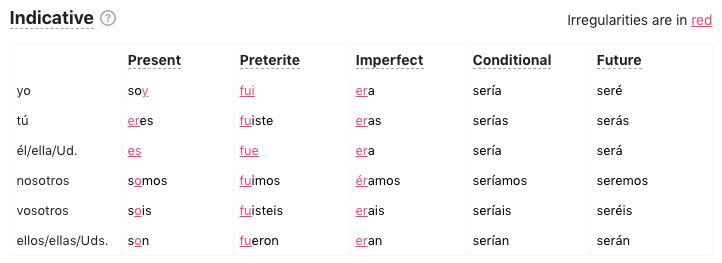
Estar
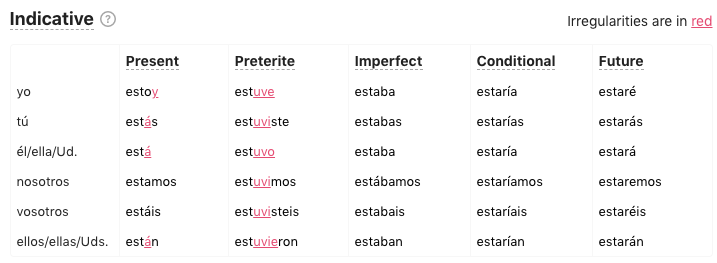
Imperative Mood
Affirmative Informal ‘Tu’ Command link
规则变化是动词的第三人称。不规则变化如下:
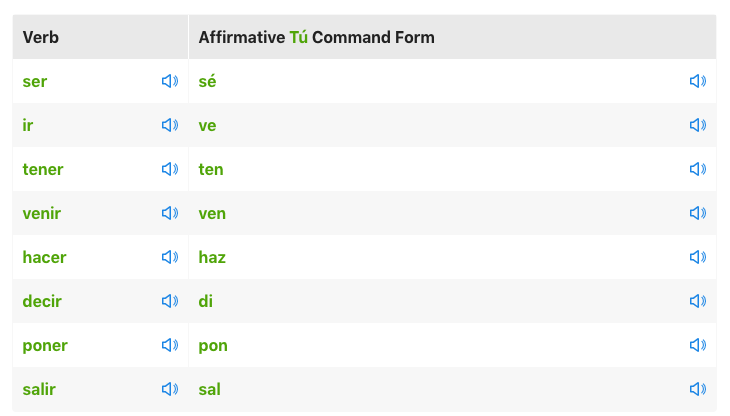
Pronouns are attached to the end of affirmative commands.
Some verbs are special when giving commands with ustedes. These unique forms all contain the letter g.
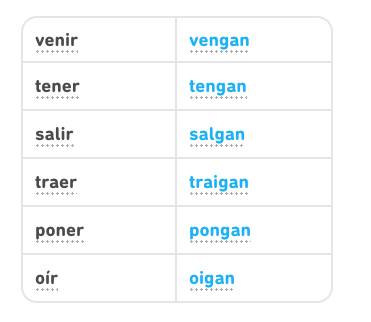
Preterite Tense Forms 过去式
There are only two sets of endings for regular preterite verbs, one for -ar verbs and one for both -er and -ir verbs. To conjugate a regular verb in the preterite tense, simply remove the infinitive ending (-ar, -er, or -ir) and add the preterite ending that matches the subject. Check out the table of regular preterite endings below.
Regular Preterite Verb Endings
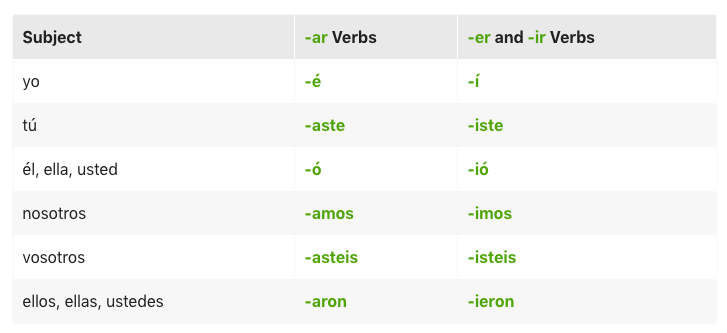
Note that the first person singular (yo), third person singular (él, ella), and second person formal singular (usted) preterite forms have tildes (written accents) on the final vowel. Keep in mind that one little tilde can change both the tense and subject of a sentence.
以-ar结尾的动词,第一人称变$a$为$\acute e$, 第二人称加$ste$, 第三人称变$a$为$\acute o$, they加$ron$, we加$mos$
以-er/-ir结尾的动词,第一人称变$e/i$为$\acute i$, 第二人称加$iste$, 第三人称变$e/i$为$\acute io$, they加$ieron$, we加$imos$
xx
Irregular Spanish Preterite Forms
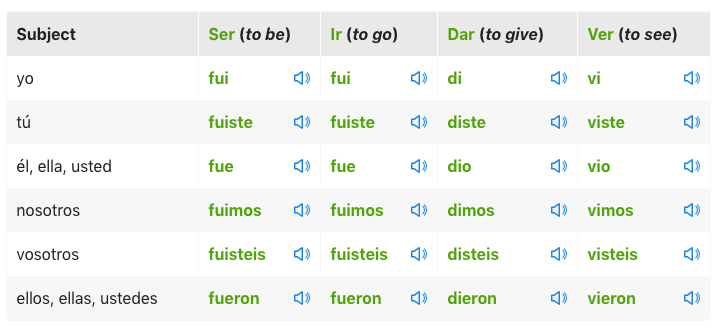
Imperfect tense forms (不完全时态) link
It is used to describe past habitual actions or to talk about what someone was doing when they were interrupted by something else.
There are only two sets of endings for regular imperfect verbs in Spanish, one for -ar verbs and one for both -er and -ir verbs.
Regular
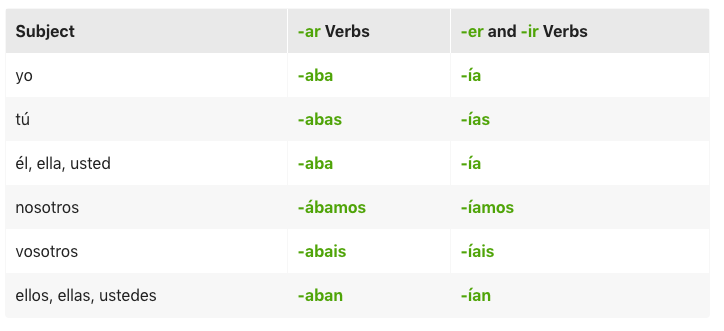
Irregular
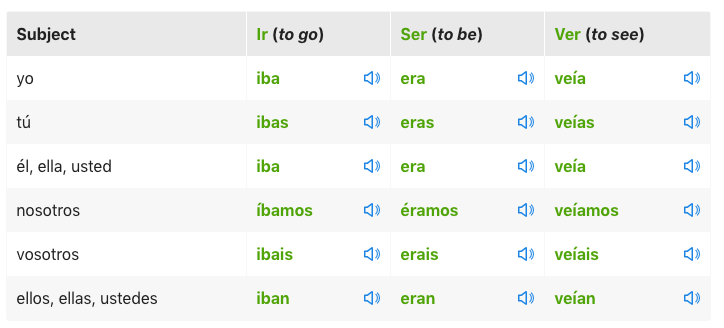
Present Participle (现在分词) link link2
Present participles in Spanish are verb forms used to express continuous or ongoing actions. Spanish present participles end in -ndo, which is the equivalent of the English ending -ing.
Regular
To form the gerundio of regular verbs, most of the time you just drop the infinitive ending (-ar, -er, -ir) and add -ando to the stem of -ar verbs and -iendo to the stem of -er and -ir verbs. Check out the table below to see how to form gerundios.

Irregular
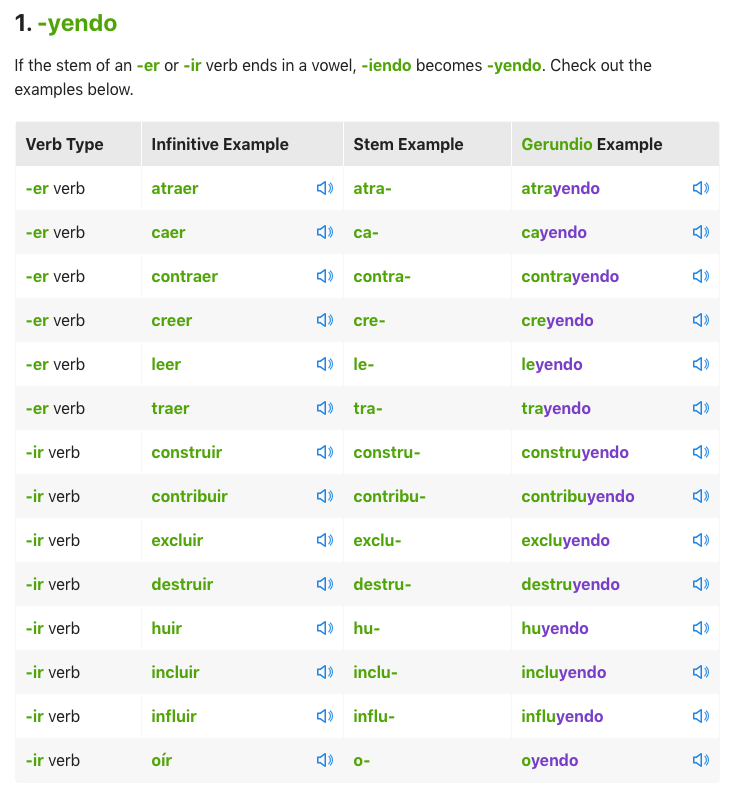
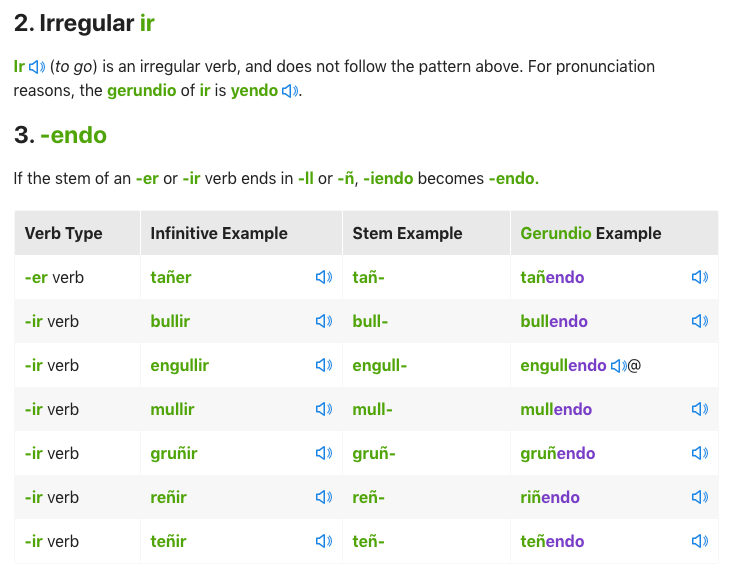
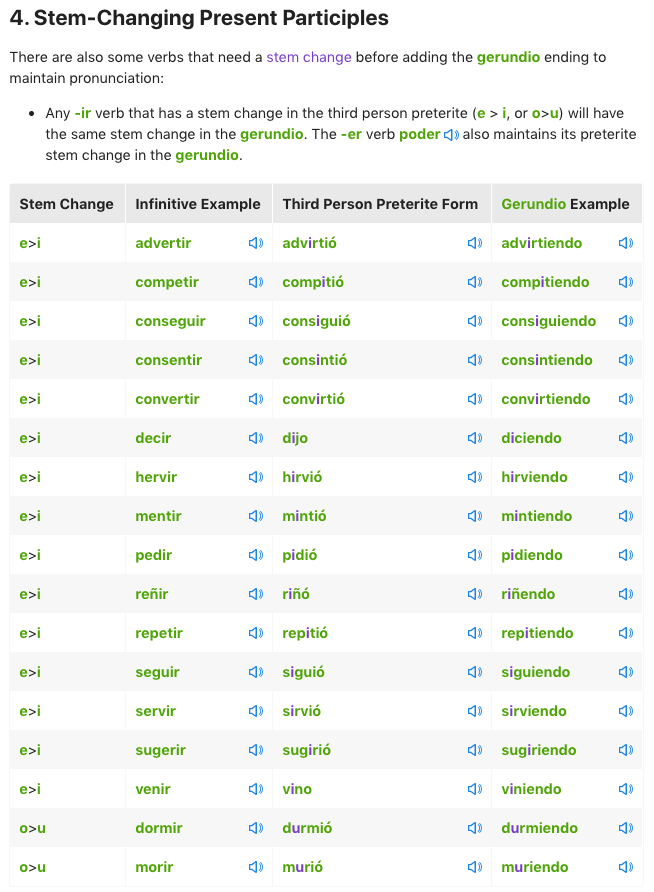
Present Perfect ( 现在完成时)
he(1) , has(2) , ha(3) , hemos(we) , han(they) + Vdo / Vido
hecho - have done | abierto - have opened | escrito-write | puesto - put | tenido - have
dicho - have told | visto - have seen |
Future Tense(将来时)
Regular ref
To form the simple future tense, simply add the correct ending to the infinitive of the verb. All verb conjugations (-ar, -er, and -ir) have the same endings in the simple future tense.
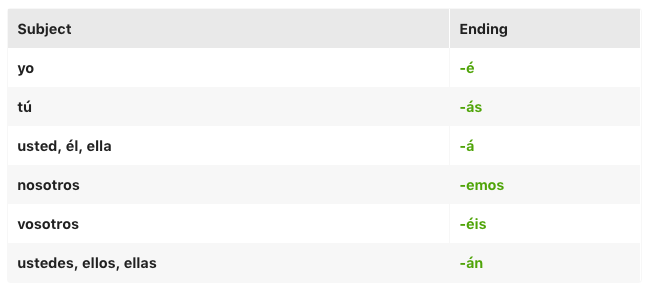
ire(1)iras(2),ira(3) iremos(we) iran- will go
sere(1) seras(2) sera(3) seremos(we) seran - will be
tendre(1) tendra(3)- will have
pondre(1)pondras(2) - will put
diran(they) - will say
hare(1) haran(they) - will hace
querre(1) querra(3) - will want
vere(1)vera(3) - will look
名词复数
以元音结尾的名词词尾加 -s
alumno - alumnos
chileno - chilenos
amigo - amigos
以辅音结尾的名词词尾加 -es
名词的性
以 “o” 结尾的名词多为阳性
piso - 层,sitio - 地方,lazo - 纽带,alumno
以 “a” 结尾的名词多为阴性
sopa - 汤,silla - 椅子,mesa - 桌子,alumna
许多以辅音结尾的阳性名词,在其词尾添加元音a,就变成了阴性名词
profesor - profesora espanol - espanola
阳性名词的复数既可以表示多个男性/雄性,也可以指多个男女。但是阴性名词复数只能表示多个女性
主格人称代词
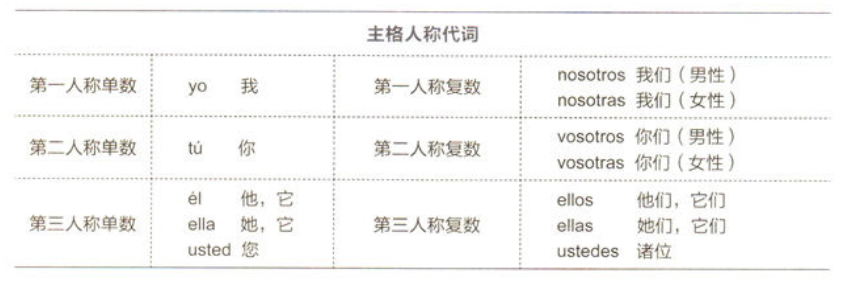
系动词变化

动词变化
规则变化
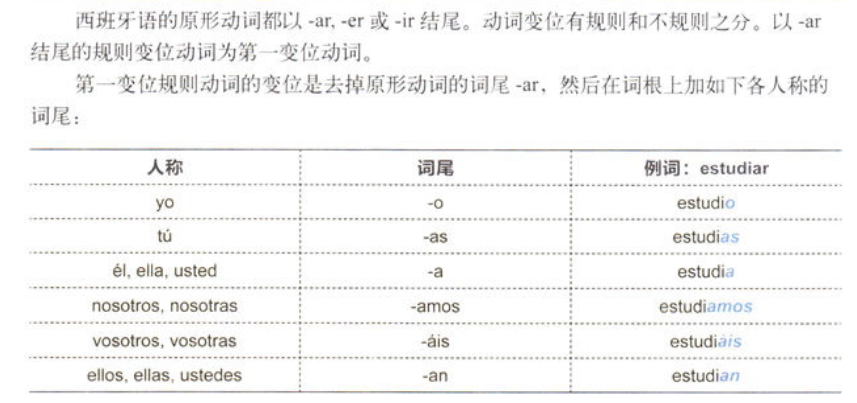
不规则变化

========
carro (car) | carta (letter) | casa (house) | cartera (purse)
vaso (glass), taza (cup)
semana (week), manana (tomorrow)
nueva (new), nueve (nine)
bajo (short), barato (cheap),
comoda (comfortable)
cerca (near)
Is That Noun Masculine or Feminine?
发音
西语字母
| 大写 | 小写 | 读音 |
|---|---|---|
| A | a | a(阿) |
| B | b | be |
| C | c | ce |
| CH | ch | che(切) |
| D | d | de |
| E | e | e |
| F | f | efe |
| G | g | he |
| H | h | a che |
| I | i | i |
| J | j | hoda |
| K | k | ga |
| L | l | ele |
| LL | ll | eye |
| M | m | eme |
| N | n | ene |
| $\hat N$ | $\hat n$ | enie |
| O | o | o |
| P | p | bei |
| Q | q | gu |
| R | r | ere |
| rr | erre | |
| S | s | ese |
| T | t | de |
| U | u | wu |
| V | v | wubei |
| W | w | double u wubei |
| X | x | egis |
| Y | y | ye / ge rui ye ga |
| Z | z | zeta |
| gu | ||
| qu |
元音字母
Aa, Ee, Ii, Oo, Uu
二重元音
由两个元音组成:强元音+弱元音;弱元音+弱元音。
强元音: a,e,o
弱元音:i,u
共14个,独立为一个音节:
ai [爱],ia [yi ya] || ei,ie || oi,io
au,ua || eu,ue || ou,uo
iu,ui
三重元音
又三个元音组成,弱元音+强元音+弱元音;字母y在词尾读[i],所以y也可以和其他两个元音构成三重元音。
buey - [buo ei i] Uruguay - [wu ru gua i]
辅音字母
辅音字母是不起发音作用的,所以需要跟元音字母搭配,才能发音。
辅音连缀
又两个辅音组成
p b c g f t d + l / r,即
pl, bl, cl, gl, fl
pr, br, cr, gr, fr, tr, dr
Mm
| ma | me | mi | mo | mu |
|---|---|---|---|---|
| ama | eme | imi | omo | umu - wu mu |
| am - 暗m | em | im | om | um - wu mu |
Nn
| na | ne | ni | no | nu |
|---|---|---|---|---|
| ana | ene | ini | ono | unu - wu nu |
| an | en | in | on | un - wu en |
Ll
| la | le | li | lo | lu |
|---|---|---|---|---|
| ala | ele | ili | olo | ulu |
| al | el | il | ol | ul |
L在词尾的时候,舌尖轻轻触碰上颚,不能卷。
Pp
| apa | epe | ipi | opo | upu |
| pa | pe | pi | po | pu |
清辅音,声带不震动,发be的音。
Tt
| ata | ete | iti | oto | utu |
| ta | te | ti | to - dou | tu - du |
清辅音,不吐气,发de
Bb
| aba - ava | ebe - eve | ibi - ivi | obo - ovo | ubu -uvu |
| ba | be | bi | bo | bu |
浊辅音,发音与Pb相同,但是声带需要震动。
Vv
| ava | eve | ivi | ovo | uvu |
| va -ba | ve - be | vi - bi | vo - bo | vu - bu |
Bb和Vv发音是一样的,一般情况读[v],双唇之间空隙,让气流通过。在以下情况读[b]:
- 单词词首
- 在字母m, n后面
Dd
| edad - eda | poed - bonei | sed - sei | comed - gomei | |
|---|---|---|---|---|
| ada | ede | idi | odo | udu |
| da | de | di | do | du |
浊辅音,发音与Tt相同,但声带需要震动。当d在字母中间时,需要舌尖微微伸出上牙,让气流通过,声带震动。当d在词尾的时候,舌尖接触上齿,让气流停止通过,不发音。
Ss
| asa | ese | isi | oso | usu |
| sa | se | si | so | su |
Cc
| ce - the | ci - thi | |||
|---|---|---|---|---|
| aga | eque | equi | oco | ucu |
| ca - ga | que - gei | qui - gui | co - go | cu - gu |
在密目c, n, t, d之前发轻微的k
$lecci \acute o n$ -> le ke ci on ; $t \acute e c nico$ -> de ke ni con
Gg
| $g \ddot u e$ - wei(喂) | $g \ddot u i$ - wei(微) | |||
|---|---|---|---|---|
| aga | egue | igui | ogo | ugu |
| ga - ga | gue - gei | gui - gui | go - go | gu - gu |
浊辅音,发音与Cc相同,但声带震动
Jj
| aja | eje | iji | ojo | uju |
| ja - ha | je - hei | ji - hi | jo - ho | ju - hu |
ge = je : hei
gi = ji : hi
Zz
| aza | ece | ici | oco | ucu |
| za - tha | ce - the | ci - | zo | zu |
不存在ze, zi。
Ff
| afa | efe | ifi | ofo | ufu |
| fa | fe | fi | fo | fu |
Hh
| ha | he | hi | ho | hu |
h不发音。hola - ola.
ch
| acha | eche | ichi | ocho | uchu |
| cha - 掐 | che - 切 | chi | cho - 球 | chu |
ch发切
$\tilde n$
| a$\tilde n$a | e$\tilde n$e | i$\tilde n$i | o$\tilde n$o | u$\tilde n$u |
| $\tilde n$a | $\tilde n$e | $\tilde n$i | $\tilde n$o - niu | $\tilde n$u - new |
$\tilde n$ : ei nie
Yy
| aya | eye | iyi | oyo | uyu |
| ya | ye | yi | yo | yu |
Rrf
| ara | ere | iri | oro | uru |
| ra | re | ri | ro | ru |
II
| alla | elle | illi | ollo | ullu |
| lla | lle | lli | llo | llu |
发音与y相同。
Xx
| [x] - Mexico | mei hi go | |||
|---|---|---|---|---|
| [ks] - axa - akasa | exe - ekse | ixi - iksi | oxo - okso | uxu - wukso |
| [s] - xa -sa | xe - sei | xi -si | xo - so | xu - su |
Ww
| wa | we | wi | wo | wu |
可以读 [double uve] 或者 [uve double], dob 累 wu wei。
发音与b, v一样。
Kk
| aka | eke | iki | oko | uku |
| ka | ke | ki | ko | ku |
发音与c相同,发g音
音节划分
有几个元音就有几个音节。
一个元音构成一个音节
a,o,e,i,u
一个辅音和一个元音
la, me,bo
两个辅音和一个元音
las,pel
重音规则
以5个元音a, e, i, o, u和n, s结尾的单词,重音在倒数第二个音节
susana -> su | sa | na
其他辅音字母结尾的单词,重音在最后一个音节傻上。
comed -> co | med
有重音符号的单词优先,忽略前面两点
$pap\acute a$ -> pa | $p \acute a$
连读
三种情况:
元音-元音连读,后面一个元音不发音
Yo me llamo Ana
Ana es mexican
辅音-辅音连读,后面一个辅音不发音
Ellos son mis amios
Entonces, somos sus alumnos
辅音-元音连读,辅音连读元音
Somos sus alumnos
Son ustedes espanol单词
